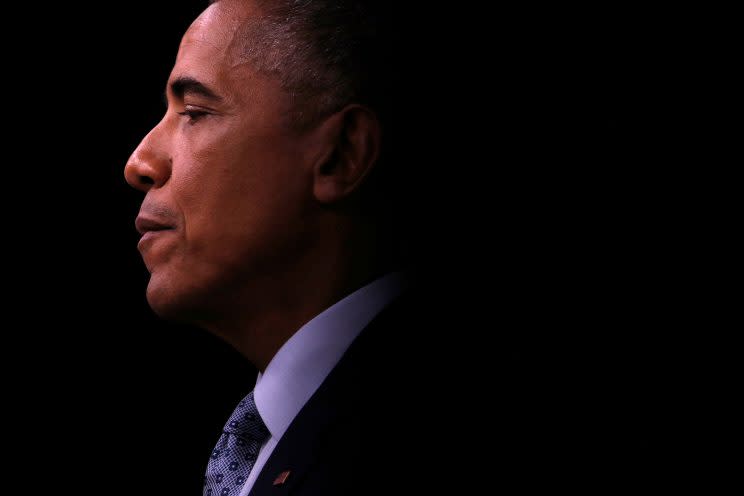Obama exits, taking his dignity with him

Historians will one day pass judgment on the Obama administration, and those who lived through it can only guess at how his legacy will be viewed. But as the tributes to the outgoing president have accumulated, one word stands out as a symbol for everything he has represented and embodied. The word is “dignity.”
Times columnist Timothy Egan expressed this theme last summer, writing: “No matter what you think of Obama the executive branch, it’s hard to argue that Obama the human being has been anything less than a model of class and dignity.” Egan actually was wrong; however obvious Obama’s class and dignity were to most Americans, it was a common trope on the far right to mock the first African-American president and his wife by comparing them to animals. But as he prepared to leave office, even political adversaries such as Sen. Tom Cotton, R-Ark., paid tribute to Obama’s “quiet dignity.” Shepard Fairey, creator of the iconic “Hope” image, which encapsulated the spirit of Obama’s first election, chose “Defend Dignity” as one of the slogans for his series of 2016 inauguration posters.
In part, of course, praising Obama’s “dignity” is a way of calling attention to the qualities that set him apart from his successor, who has famously boasted about his sexual conquests and who delights in insulting his opponents with mocking Twitter posts. One could no more imagine Obama doing any of those things than, say, wrestling WWE impresario Vince McMahon as a promotional stunt.
But the word also conveys something essential about the man: his impeccable personal life and financial probity, his fierce loyalty to his family, an uncanny inner serenity that allows him to rise above insults even when few would have faulted him for an outburst of anger. When a Republican congressman interrupted him by shouting “You lie!” during his 2009 address to Congress, Obama responded mildly, “That’s not true,” and went on with his speech. His commitment to civil discourse, his deference to the traditions and forms of democracy, have few parallels in recent history.
“He is the slowest person to anger; the least vindictive I’ve ever known, inside politics or out,” wrote Obama’s longtime confidant and aide David Axelrod in an email to Yahoo News Deputy Editor Dan Klaidman. “I don’t remember him saying much after Joe Wilson shouted ‘you lie.’ He even greeted the birther stuff more with incredulity than anger because he viewed it as absurd. … And attacks on Michelle always raised his ire.”
Axelrod acknowledged “moments when he got angry, like when Congress balked on gun legislation after Newtown. [Senate Republican leader Mitch] McConnell’s cynical and implacable opposition angered him because it was an impediment to progress.
“But when Joe Biden got out ahead of him on gay marriage, there were folks in the White House who were really irritated, but Obama wasn’t one of them. He told me he couldn’t ‘get angry at Joe for being big-hearted.’
“Obama just has this incredible equanimity that was essential, given the challenges and provocations he faced. The tougher the moment, the calmer and more focused he was. And that evenness served the whole operation well.
Slideshow:Barack Obama: A presidency in pictures >>>
He has a great sense of history and [of] the fact that the presidency is a trust, and democracy a commitment, that [have] to be constantly tended.
“And I think he’s always felt a special responsibility, because of his own place in history, to conduct himself with dignity and integrity.”
Obama’s “place in history,” of course, was as the first African-American president. The dignity and restraint that came naturally to him were also prerequisites for his success on the national political stage; for the epithet “angry black man” to be attached to him would have been fatal to his reputation and career.
It was a lesson brought home to him in his first year in the White House when his friend Harvard Professor Henry Louis Gates was arrested after a confrontation with a Cambridge, Mass., police sergeant. (Gates had been accidentally locked out of his own home and was attempting to force open the door; a neighbor, suspecting a burglary, called the police.) Obama’s offhand remark that the police “acted stupidly” touched off a racially charged uproar that he had to quell by inviting Gates and the officer to the White House for a meeting that has gone down in history as the “beer summit.”
It’s worth noting that personal dignity wasn’t always, even in recent history, a necessary quality for a president. Lyndon Johnson, as chroniclers have determined, was a compulsive womanizer and sexual braggart who famously showed off to the public a surgical scar on his abdomen. The sainted Harry Truman wrote from the White House to threaten — perhaps not entirely seriously — a punch in the nose to a music critic who had panned Truman’s daughter Margaret’s singing. But they were white.
And, of course, as admirable a man as Obama has shown himself to be, dignity can be an equivocal virtue in a president, especially in highly partisan times. An essay in Slate by Michelle Goldberg criticized Obama for remaining above the fray in relation to Russian meddling in the election: “He has his dignity and his faith in civic norms. Republicans have the government.” Goldberg argues that a more assertive approach to governance would have better served his party and the causes he believed in. The times, she believes, called for a different kind of president. And now the country is getting one.



